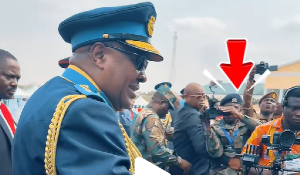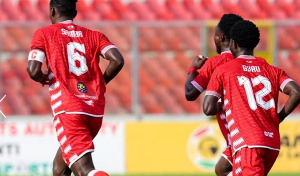Part 1
We should thank Prof. Kwesi Atta Sakyi for his tribute to Dr. J.B. Danquah, believing as it is that he penned his tribute to Danquah in the spirit of national conciliation. But then again, writing in the spirit of reconciliation does not necessarily mean sacrificing the facts of history, objectivity, and scientific analysis on the altar of truth. History does not work that way. This is not, nevertheless, an attempt to assail Prof. Sakyi’s intellect or to question his integrity.
Notwithstanding the above, Prof. Sakyi left out a number of important facts in his tribute including: 1) Danquah’s call for Nkrumah’s neck prior to the Positive Action in 1950; 2) Danquah’s disregard for any laws under the Nkrumah government; 3) Danquah’s turning his residence in Accra as the meeting place to hatch plots to assassinate Nkrumah and to overthrow Nkrumah’s government, which was the cause for his first arrest and subsequent detention in accordance with the law of the land, the Preventive Detention Act (PDA). For instance, the 1958 Jackson Commission Report quotes Danquah as saying the people of Akyem were not subject to the laws of Ghana; the Jackson Commission Report also shows Danquah saying the laws of Ghana did not apply to him; 4) Danquah’s association with the CIA as revealed to the world by William P. Mahoney, the American Ambassador to Ghana at the time, through his son Richard D. Mahoney (See his book “JFK: Ordeal in Africa” and Nana Akyea Mensah’s (Odikro) article “J.B. Danquah Was a CIA Asset”; 5) the victims of the Danquah-Busia National Liberation Movement’s terrorism; 6) the several assassination attempts on Kwame Nkrumah; and 7) Danquah’s “connection with the ritual murder of Odikro of Akyea Mensah of Apedewa” that “brought him [Danquah] into conflict with Governor Allen Burns” (See Dr. Botwe-Asamoah’s “Kwame Nkrumah: The One and Only Founding Father of Ghana (1)).
Having said this, there are a few possible misconceptions we wish to bring to readers’ attention as regards certain components of Prof. Sakyi’s tribute to Danquah. We shall begin as follows:
First of all, we wish to point out that George Alfred Grant (Paa Grant) was the financier and president of the United Gold Coast Convention (UGCC). Therefore, Paa Grant’s name should have at least preceded those of J.B. Danquah, Awoonor-Williams, Ebenezer Ako-Adjei, William Ofori Atta, Obetsebi Lamptey, Edward Akufo-Addo, etc. As such, Danquah was not the founder of the UGCC as is being mischievously and falsely peddled about by uninformed commentators; contrary to street and lorry-station historians, he was rather a co-founder of the UGCC. This fact may not be necessarily significant, but the nominal line-up of the founding members of the UGCC as per Prof. Sakyi’s tribute, may somehow give the wrong impression to the intellectually gullible and grossly misinformed that the UGCC’s formation was, perhaps, Danquah’s brainchild. It was not. Therefore, Paa Grant being the UGCC’s financier and president should have had his name given nominal precedence over those of the others in the line-up.
What is the point of all these? Actually Danquah served the UGCC as its vice-president whose role was to accompany and introduce Nkrumah at public rallies. It was why Danquah, in 1948, assured mass rallies in Accra and Secondi that “If UGCC fails you, Kwame Nkrumah will never fail you.” Then, as a matter of fact, there is also another serious misconception that it was Danquah who brought Nkrumah to the Gold Coast. This is totally false. That credit equally goes to Ebenezer Ako-Adjei, Awoonor-Williams, and Paa Grant, for it was Paa Grant who purchased Nkrumah’s ticket. What is more, it was Ako-Adjei who first wrote to Nkrumah asking him to consider the Secretary-Generalship of the UGCC given the UGCC inadequacies. Ako-Adjei’s recommendation to the group was based on firsthand knowledge of Nkrumah’s superb organizational skills, leadership roles during and after the 5th Pan-African Congress in Manchester, as well as Nkrumah’s anti-colonial campaigns and Union of West African States agitation while a student at the University of Pennsylvania in the US.
And without waiting for Nkrumah’s reply, Awoonor-Williams wrote the next letter which was then signed by Paa Grant, and sent to Nkrumah. Danquah was the last in line to write to Nkrumah to accept the position of Secretary General. As a matter of fact, it was George Padmore and the West African National Secretariat (WANS) that exerted the greatest influence upon Nkrumah to accept the offer (See Dr. Zizwe Poe’s “Kwame Nkrumah’s Contributions to Pan-Africanism: An Afrocentric Analysis,”; see also Marika Sherwood’s “Kwame Nkrumah: The Years Abroad 1935-1947”). So, what are all these plain lies and factual distortions about Danquah’s exclusively inviting Nkrumah to the Gold Coast to take over the position of the Secretary-Generalship of the UGCC coming from to the exclusion of the others, if we may ask? These glaring revisionist distortions are patently part of the overall strategy of the keepers of the UP tradition and their ideological scions to appropriate the collective legacies of the individual members of the leadership of the UGCC for Danquah alone. Yet, the same shameless Machiavellian manipulators of Ghana’s political history are the first to resist any serious attempt to accord Nkrumah credit for winning the independence of Ghana.
The UGCC was a convenient marriage between two entities, the Gold Coast National Party and the Gold Coast League, emerging from the elitist womb of the educated class of the then-Gold Coast as pressure groups whose strategic goals included securing import licenses for African merchants from and, as well, sharing political power with the Colonial Government. Also, the ideological or political orientation of either the Gold Coast National Party and the Gold Coast League or the UGCC lacked a focus on nationalistic considerations for including Ashanti Province, the Northern Territories and Trans-Volta Togoland in their institutional frameworks. In other words, there were no nationalistic auras about these organizations. It was Nkrumah who would eventually give the UGCC a strong nationalistic outlook. Simply put, the key focus of the UGCC was an economic one, namely protecting the economic interests of its membership by sharing political power with the Colonial Government. For them political independence for the Gold Coast was not their primary preoccupation, which was far from their economic interests. Thus, this limited purview of the UGCC changed with the arrival of Nkrumah.
In fact, the UGCC did not get down to business until Nkrumah’s arrival (See the Watson Report). Dr. Botwe-Asamoah notes: “Until the arrival of Kwame Nkrumah, the UGGC was a loose movement without any national grievances and strategy, nationalist stance, mass participation, and strong agitation for an immediate political independence. But all that changed when Kwame Nkrumah arrived to assume the position of the General Secretary of the UGCC.” The UGCC almost lacked what could be technically construed as a viable institution with a living infrastructure of organizational focus, not worth the dead soul of a paper tiger. Nkrumah even helped the leadership of the UGCC open a bank account as the UGCC did not have one on his arrival. Nkrumah also realized the UGCC did not have funds (See Dr. Zizwe Poe and Nkrumah’s “Autobiography of Kwame Nkrumah”).
As well, it was Nkrumah who opened at least five hundred branches of the UGCC within six months under unpleasant conditions, such as walking on foot when his car broke down. On one occasion he slept on a roadside when his car broke down. It was also Nkrumah who would suggest to the Working Committee of the UGCC to found a newspaper, arguing that “national liberation in the form of political action had never succeeded without a newspaper (See Dr. Bowte-Asamoah).” Nkrumah put his management experience and organizational skills to work, thus offering all the necessary technical assistance to rectify the UGCC’s institutional lapses. “Knowing that organization determines everything, Nkrumah devised some effective strategies to make the UGCC reflective of all and sundry. THIS HE DID BY CHANGING THE UGCC CONSTITUTION TO BRING INTO ITS MEMBERSHIP BOTH THE INTELLIGENTSIA AND THE ORDINARY PEOPLE FROM THE ASANTE, NORTHERN AND TRANS-VOLTA REGIONS,” writes Dr. Botwe-Asamoah (our emphasis). Why did the leadership of the UGCC fail to include the Ashanti Province, the Northern Territories, and Trans-Volta in the UGCC constitution prior to Nkrumah’s arrival?
Dr. Botwe-Asamoah continues: “As a man who acts according to plan, Nkrumah urged the UGCC to develop a policy with clear and defined objectives...He wrote a circular letter dated February 20, 1948 to the working committee of the UGCC, proposing the setting up of a shadow cabinet for their consideration. The purpose was to enable the duties of the many ministries in order to ‘forestall any unpreparedness on our part in the exigency of self-government being thrust upon us before the expected time. The proposals also included a three-face organizational work. These proposals inspired the enthusiasm and determination of the members of the UGCC, to the extent of resolving to attain political power and placing it in the hands of the Africans (our emphasis; See Timothy Bankole’s book “Kwame Nkrumah: His Rise to Power”).
Further, Danquah himself, a sycophantic ally of imperialists and colonialists, did not believe in the total self-governance of the Gold Coast away from the strangulatory political hold of the metropole, thus his speaking to that effect: “I AM SOMETIMES MUCH SURPRISED WHEN I SEE MANY OF MY COUNTRYMEN TERRIFIED BY THE USE OF THAT WORD, ‘SELF-GOVERNMENT.’ THEY ARE TERRIFIED OF IT BECAUSE THEY THINK IT MEANS THE DESIRE TO BREAK AWAY FROM THE BRITISH EMPIRE AND BECOME INDEPENDENT OF THE BRITISH. IF IT COMES TO THAT, IF IT COMES TO A DECISION TO BREAL AWAY FROM THE BRITISH CONNECTION, I WOULD BE THE LAST PERSON TO EXPRESS SUCH A TERRIFIC WISH (See the Historic Speeches of J.B. Danquah). What then did the Orwellian phrase “self-government in the shortest possible time mean” to Danquah or to the leadership of the UGCC? The latter phrase, in fact, becomes appraisingly problematic in the general sentential context of Prof. Sakyi’s “However, had Ghana followed Danquah’s conservative and constitutional step-by-step process, Ghana’s independence could have been delayed by 10 years or more.” Putting the phrasal wording of the UGCC and Prof. Sakyi’s loose re-interpretation of it together however, we have a clear picture asymptotically close to the proverbial basket receiving an ocean of water.
What, then, is the basis for Prof. Sakyi’s stochastic if highly subjective exegesis of “self-government in the shortest possible time”? Is 10 years or more not at least 10 years which could as well have been eternity? On the other hand if we follow his logic and arbitrarily settle on his 10 years, the minimum of Prof. Sakyi’s stochastic presentiment of nationhood for the Gold Coast, what could have been the guarantee that Danquah’s gradualist approach would have succeeded if Nkrumah and the CPP, hypothetically the Opposition in our scenario analysis, had resorted to the terroristic contingencies of the National Liberation Movement (NLM)? And what would have happened to Danquah’s gradualist approach if Nkrumah and the CPP had gone to Britain to lobby against independence, like Busia unabashedly did, and the British had accordingly agreed to act upon it? Unfortunately, the underlying assumptions to the answers of these questions, it seems, are not allowed overt possibilities for critical valuation in Prof. Sakyi’s article. Then again, is Prof. Sakyi also implying that Danquah’s “step-by-step” process is constitutional and Nkrumah’s “self-government now” unconstitutional?
It appears Prof. Sakyi’s statement requires additional evidential qualification to give it a unique constitutional identity of mathematical credibility! That statement without the imposed muscular authority of further evidential expatiation makes for a livid disputation. The more important question is this: Which colonized or suppressed people have gained their freedom and independence on a silver platter? We know the salient facts of history clearly point to the compass of demanding or fighting in order for a people to secure their independence and freedom from their overlords. “Freedom is never voluntarily given by the oppressor,” said the late Martin Luther King, Jr. “It must be demanded by the oppressed.” The late Nelson Mandela also maintained that the 1988 Battle of Cuito Cuanavale (Angola), in which Namibian, Cuban, and Angolan soldiers dealt a devastating blow to the perceived and real invincibility of South Africa’s army, defined an epochal moment on the long journey to the dismantlement of Apartheid (See Mandela’s and Castro’s books “Cuba and Angola: Fighting for Africa’s Freedom and Our Own” and “How Far We Slaves Have Come: South Africa and Cuba in Today’s world”). In Mandela’s own words the Battle of Cuito Cuanavale more than anything else accelerated the dissolution of Apartheid.
Furthermore, the political subtexts of Malcolm X’s phrase “by any means necessary” and the American War of Independence, to mention but two, speak to the radical exigency of armed struggle or of a people demanding their freedom from their oppressors. Malcolm X made his position clear when he said: “We declare our right on this earth to be a man, to be a human being, to be respected as a human being, to be given the rights of a human being in this society, on this earth, in this day, which we intend to bring into existence by any means necessary” (See George Breitman’s edited volume “By Any Means Necessary: Speeches, Interviews, and a Letter by Malcolm X”). Dr. Botwe-Asamoah would also write to that effect: “Did the subjugated Irish people ‘ensure by all legitimate and constitutional means’ so that ‘the direction and control of government’ be passed on from the Anglo-Norman rulers into their (Celtics’) hands ‘in the shortest possible time’? If the Irish people would wage a war against the Anglo-Norman occupation of Ireland from 1177 to 1921, especially the IRA-led ‘Irish War of Independence’ from 1916 to 1921 for a Home Rule, what about a little over 100-year-old British Gold Coast [Black African] colony?” There is no doubt that the underlying assumptions of Dr. Botwe-Asamoah’s comparative methodology tears into the fragile logic of the UGCC’s nebulous phrase “independence in the shortest possible time.”
However, what is not mentioned by the slimy proponents of the “independence in the shortest possible time” mantra in general discourses on Ghana’s political history is that, the British Government began flying in war planes into the Gold Coast in the lead-up to Nkrumah’s Positive Action. What for, if not to crush the mass protestation of unjust colonial rule in the Gold Coast? This was when Jawaharlal Nehru, the first Prime Minister of independent India, sent a strong warning to the British Government to desist from crushing the Positive Action mass protest campaign against unlawful British colonial rule in the Gold Coast, else India would retaliate by attacking Britain. The irrefutable success of the Positive Action, Nkrumah’s brainchild, would come to represent a boon to the Gold Coast’s independence struggle.
Jomo Kenyatta was, indeed, right when he asserted that Ghana’s independence signalled the end of colonialism in Africa, thereby occasioning the institutional birth of the All-Africans People’s Conference that first brought together, in 1958, eight independent African nation-states and tens of delegates from other African countries, etc., to, as a matter of principle, strategize for the total decolonization of the entire continent. The powerful, magnetic example of Nkrumah’s leadership made this momentous occasion happen. In hindsight part of the success of the Algerian Revolution, for instance, goes to Nkrumah given that he and Frantz Fanon, the Provisional Algerian Government’s Ambassador to Ghana and the man whose works impacted liberation movements around the world, including the U.S. Civil Rights Movement, together worked on certain tactical and strategic modalities that directly and indirectly impacted the decolonization of Algeria. These lasting successes came about without any roles played by Danquah.
Indeed Nkrumah’s matchless leadership in decolonizing Africa via his securing independence for Ghana spawned revolutionary and liberation movements across the continent, prying one African country after another from the prehensile claws of colonialism. His Positive Action had a domino effect on Africa and the West, particularly on black struggle in the US. Yet a gulf of methodical, strategic, tactical, philosophical, and ideological differences existed between Nkrumah and Danquah regarding the decolonizing of the Gold Coast. “For whereas Nkrumah challenged the STATUS QUO of the colonial order and sought to replace it with a novel socio-political order, his opponents, such as J.B. Danquah, sought to uphold the SATUS QUO ANTE of the colonial order, their political aim was to replace the colonial personnel with an African personnel while maintaining the COLONIAL SOCIAL STRUCTURE,” writes Dominic K. Agyeman in “Social and Political Outlook” (See Kwame Arhin’s edited volume “The Life and Work of Kwame Nkrumah). Agyeman adds: “Indeed Danquah and his associates saw themselves as the natural or the legal successors to the colonial administration.”
Whence came the ectopic notion that Danquah and his associates had an exclusive natural claim to the rulership of the new nation, to become Ghana? Was it because of Danquah’s royalty? And if so, was Nkrumah not a royal too and who also became a king at Nkroful? In fine, understanding the full scope of Agyeman’s analysis about the differences between both men’s political agenda, goals and objectives is essential to capturing the widening ideological and philosophical drift between them, Danquah and Nkrumah. In short, while Nkrumah fought for popular and economic democracy and a unitary government, Danquah championed the cause of property-owning democracy and secessionism. This explains why the so-called Doyen of Gold Coast politics was rejected by the electorate in his own Central Abuakwa constituency in the 1954 and 1956 general elections to represent them in parliament. Again this same Doyen of Gold Coast politics was totally rejected by the people of Ghana in the 1960 presidential election.
We shall return...
Opinions of Wednesday, 11 February 2015
Columnist: Kwarteng, Francis
Doyen of Ghana Politics-J. B. Danquah, A Tribute
Entertainment













